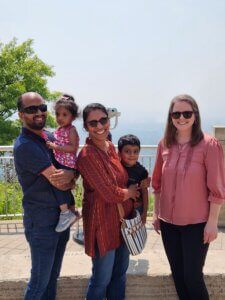First Friend program bears fruit: Beth Franklin
March 18, 2024
| By La Crosse Community Foundation |
Program builds social capital to attract, retain talent
In today’s competitive job market, where workforce shortages are increasingly prevalent, innovative talent attraction and retention strategies are crucial. One effective way to accomplish that is through developing social capital — a concept the First Friend program at the Greater La Crosse Area Chamber of Commerce is using to significant effect.
Spearheaded by Beth Franklin, workforce strategies director, the program has demonstrated remarkable success as a workforce solution. It’s been instrumental in addressing diversity, equity, and inclusion challenges in talent attraction.
Impressive metrics underscore its impact. Over five years, the program has served nearly 500 individuals and families relocating to the area and achieved a 92% retention rate. First Friend was also one of three finalists in the 2023 Wisconsin Economic Development Association awards for its contribution to talent attraction and retention, particularly in diversity, equity and inclusion.
Its success demonstrates that social capital is good not only for individuals and families but also for business and economic development.
What is the First Friend program, and how does it build social capital?

Through her work with the First Friend program at the Greater La Crosse Area Chamber of Commerce, Beth Franklin, right, helped connect the Savisesh Malampallayil and Parvathi Ganesh family with others in the community when they moved to La Crosse. Malampallayil and Ganesh are professors who relocated from New York.
The First Friend program launched about five years ago to address workforce challenges in the Greater La Crosse area, mainly focusing on attracting and keeping talented employees in the region.
Building social capital is a big part of what we do, creating networks on both an individual and group level. From the start, I’ve been reaching out to all corners of the community, like school districts, nonprofits, and various organizations, to find connections for newcomers. We’ve built a network of over 150 local partners engaging in the program to foster a sense of belonging.
It’s about providing that safety and sense of belonging right from the start, helping newcomers integrate smoothly into the community, and expanding their social networks. We like to think of it as a giant safety net for people relocating to our area. It’s providing friendships. It’s making us a more inclusive community.
How do you create honest first impressions about the La Crosse community to possible new neighbors of diverse backgrounds?
When giving community tours or holding introductory talks, honesty is key. I strive to represent our community truthfully, backed by extensive research across various sectors like government, childcare, housing, and recreation opportunities.
Addressing community shortcomings is part of that. We don’t shy away from discussing issues like crime or homelessness. We also highlight efforts by local authorities, businesses, and nonprofits in tackling these challenges.
That authenticity is crucial for clients from underrepresented backgrounds, who comprise nearly 50% of our First Friend participants.
I don’t speak for these communities; instead, I connect newcomers with residents sharing similar identities, like race, ethnicity, faith, LGBTQ status, or those with neurodiverse children. For instance, I link new Indian families with Indian residents in our network who can share their genuine experiences. These connections allow newcomers to gain an authentic perspective and decide if La Crosse is the right community for them.
What “third spaces” have you found La Crosse has available that are open and welcoming to all community members?
In La Crosse, numerous organizations and spaces are dedicated to fostering belonging, equity, and inclusion. Examples include public libraries, the Franciscan Spirituality Center, the Greater La Crosse Area Diversity Council, and diversity departments in local higher education institutions.
These spaces aim to create safe and inclusive environments, but ultimately, it’s the newcomers who decide if they feel safe and welcome. Recognizing that not everyone feels comfortable in all spaces, the First Friend program focuses on connecting individuals based on shared hobbies, interests, and life experiences, helping them find their smaller community within the larger one — and nurturing inclusivity through these connections.
Some time back, I was meeting with a newcomer and asked him how everything was going. His answer resonates with me today. He said, “You know, I’m having a really hard time making connections. It’s not necessarily that I’m not welcome at somebody’s backyard barbecue. It’s that they didn’t think to invite me in the first place.”
That drives my work: Ensuring everyone is invited to the table.
To learn more or become involved with the First Friend program, email Franklin at beth@lacrossechamber.com
Article reprinted with permission from the La Crosse Tribune.
